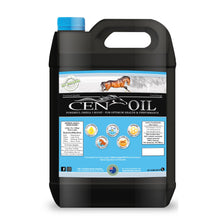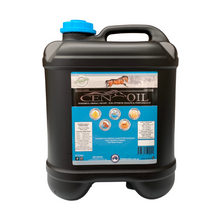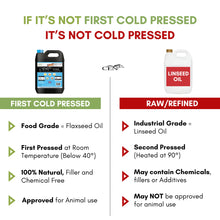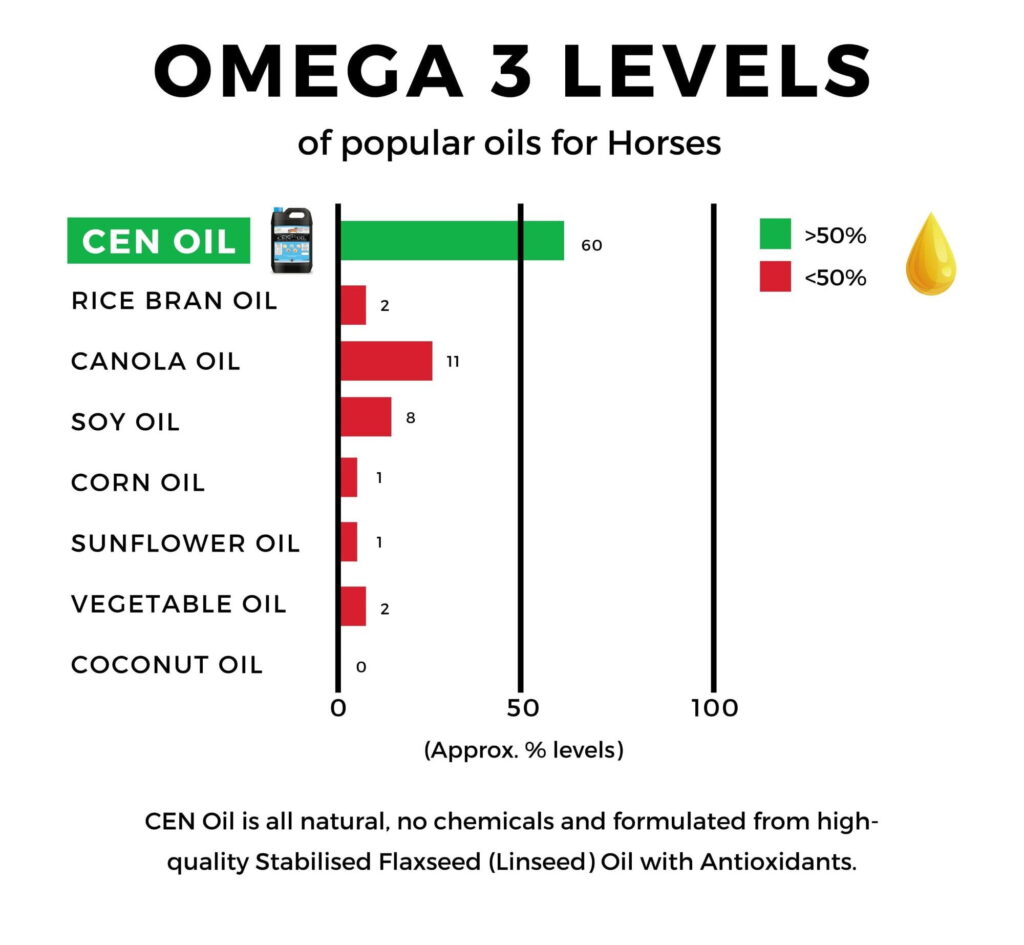Food Grade First Cold Pressed At Room Temperature Making This A True Cold Pressed Oil
Food Grade Flaxseed Oil for horses containing a minimum of 57-60% Omega 3.
CEN Oil provides a high-quality Flax Plant (Linum usitatissimum) based source of Omega 3 – an essential fatty acid that may help to; support digestive function through enhanced absorption of nutrients, strengthen the immune system, improve skin, coat & joint health and reduce irritation from common skin conditions.
CEN Oil is manufactured in small batches using the highest quality seeds, and produced to human food grade standards using no chemicals, solvents or heat in the extraction process.
First Pressed Oil is the true Cold Pressed Oil. Oils that are pressed more than once are known as Raw or Refined, they go through a heating process up to 90 degrees Celsius.
Article: Is Your Oil Really Cold Pressed?
Key Features of CEN Flaxseed Oil For Horses
- Food Grade Flaxseed Oil For Horses – Stabilised with Natural Antioxidants & Nitrogen
- Concentrated Omega 3 Supplement
- No Sugar or Starch
- Natural Anti-inflammatory
- May Reduce Inflammation of the Joints and Skin
- Immunity Booster
- Great Source of Cool Calories
- Suitable for Ulcer-Prone Horses
- Does not trigger “hot” behaviour due to the way it is metabolised
- Approved For Animal Use
Benefits
-
Formulated By Nutritionists
Trusted by over 7,500 happy horses and owners.
-
Australian-Made Since 2014
Proudly Australian Made & Owned, manufacturing all our products in Australia.
-
All Natural Ingredients
All our products are Chemical Free. We only use natural sources.
Flaxseed oil has gained significant attention in the equine community due to its potential health benefits for horses. A recent study conducted on this topic shed light on the advantages of incorporating flaxseed oil into equine diets.
Enhanced Coat and Skin Health:
The study revealed that Flaxseed oil can greatly contribute to improving a horse’s coat and skin health. By supplementing their diet with Flaxseed oil, horse owners can expect to observe a shinier, softer, and healthier coat. Additionally, linseed oil has been shown to alleviate common skin issues, such as dryness, itching, and inflammation.
Support for Joint Function:
Another significant finding of the study was the positive impact of Flaxseed oil on joint health in horses. The omega-3 fatty acids present in Flaxseed oil possess anti-inflammatory properties, which can aid in reducing joint inflammation and promoting joint mobility. Horses suffering from arthritis or joint stiffness may benefit from the inclusion of Flaxseed oil in their diet.
Digestive Health Improvement:
Flaxseed oil has been found to have positive effects on equine digestive health. The study indicated that linseed oil can enhance digestion and absorption of nutrients, leading to better overall digestive function. Moreover, it may assist in preventing and alleviating common digestive issues, such as colic and gastric ulcers.
Boosting the Immune System:
The immune-boosting properties of flaxseed oil were highlighted in the study. The oil’s high concentration of omega-3 fatty acids helps strengthen the immune system, making horses less susceptible to infections and diseases. By incorporating Flaxseed oil into their diet, horse owners can aid in maintaining their horses’ optimal health and well-being.
Weight Management Support:
For horses struggling with weight management issues, Flaxseed oil can be a valuable addition to their diet. The study demonstrated that the oil’s healthy fat content helps regulate weight by promoting lean muscle development while reducing body fat. This makes Flaxseed oil an ideal dietary supplement for horses requiring weight gain or weight loss.
The research conducted on the benefits of Flaxseed oil for horses underscores its potential to significantly improve various aspects of equine health.
From enhancing coat and skin health to supporting joint function and boosting the immune system, Flaxseed oil has proven to be a valuable supplement for equine diets. By incorporating a quality Flaxseed oil such as CEN Oil, horse owners can contribute to their horse’s overall well-being and quality of life.
Stomach
CEN Oil is highly suitable for ulcer-prone horses, due to its nutrient profile and anti-inflammatory properties.
Hoof Integrity
Omega 3 is important for the hoof wall microtubules and laminae so they are built with suppleness and strength. The slick-looking surfaces are brought from a network of fats and waxes. The function can be described as the “glue” holding the hoof together. They keep the environmental moisture out but the critical tissue moisture in.
Why CEN Oil is More Effective than Other Flaxseed Oils for Horses?
CEN Oil is the best oil choice for horses due to its high Omega 3 levels. Most oils contain Omega 6 and 9 but low Omega 3 (coconut oil contains no Omega 3 and is mainly saturated fat). There are many oils available on the market with an unnatural Omega profile, having higher levels of Omega 6 to Omega 3 (which is opposite to what is found in natural fresh pasture. (1)(2)). Dr. Juliet Getty – a highly regarded and internationally respected, independent equine nutritionist writes:
“Omega 3s block the formation of inflammatory molecules that are readily formed from Omega 6’s. Take a close look at the fat sources you are feeding to confirm that enough Omega 3’s are in the diet.”
Written By:
Bryan Meggitt (BMedSc. GCrtMedSc.)
Co-Founder / Blood Scientist | CEN Nutrition
Science Reference
(1) Wyss, U., Morel, I., and Collomb, M., 2006. Fatty acid content of three grass/clover mixtures. Grassland Science in Europe, vol. 11, 348-350. (2) Dubois, V., Breton, S., Linder, M., Fanni, J., and Parmentier, M., 2007. Fatty acid profiles of 80 vegetable oils with regard to their nutritional potential. European Journal of Lipid Science and Technology, 109(7), 710-732. (3) Hansen, R.A., Savage, C.J., Reidlinger, K., Traub-Dargatz, J.L., Ogilvie, D.M., and Fettman, M.J., 2002 Effects of dietary flaxseed oil supplementation on equine plasma fatty acid concentrations and whole blood platelet aggregation. Journal of Veterinary Internal Medicine, 16(4), 457-463. (4) Hess, T. M.; Rexford, J. K.; Hansen, D. K.; Harris, M.; Schauermann, N.; Ross, T.; Engle, T. E.; Allen, K. G. D. and Mulligan, C. M. 2012. Effects of two different dietary sources of long chain omega-3, highly unsaturated fatty acids on incorporation into the plasma, red blood cell, and skeletal muscle in horses. Journal of Animal Science 90:3023-3031 (5) Abdelkarem, H.M; Fadda, L.H. 2017. Flaxseed and quercetin improve anti-inflammatory cytokine level and ins. sensitivity in an animal model of metabolic syndrome, the fructose-fed rats. Arabian Journal of Chemistry 10:2:S3015-S3020 (6) Vineyard, K. R.; Warren, L. K. and Kivipelto, J. 2010. Effect of dietary omega-3 fatty acid source on plasma and red blood cell membrane composition and immune function in yearling horses. Journal of Animal Science 88:248-257.
Nutritional Info
All natural, no chemicals and formulated from First Cold Pressed Flaxseed Oil with Antioxidants. It is essential to store CEN Oil below 30°C. If storing in feed sheds, remove to a cooler place on temperature days above 30°C. All feed products should be kept below 30°C to maintain freshness and quality.
Nutritional Analysis
| CEN Oil Omega Profile | |
|---|---|
| Omega 3 | 60% |
| Omega 6 | 17% |
| Omega 9 | 16% |
Feed Rate – How Much Flaxseed Oil To Give Your Horse
For maintenance 10mL per 100kg Bodyweight daily. Increase according to workload. CEN Oilshould be the last additive to the feed. Based on a 500kg horse —
| Work Load | Feed Rate |
|---|---|
| Maintenance | 50mL |
| Light work | 100mL |
| Moderate work | 150mL |
| Heavy work | 200mL |










